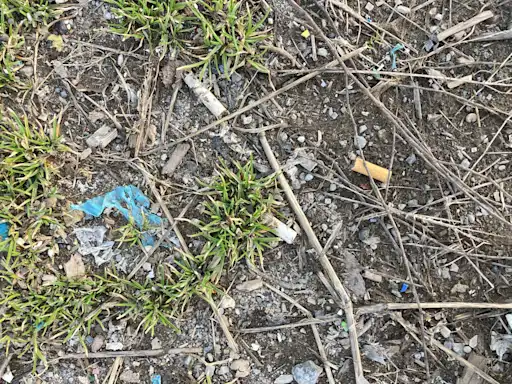Written by Rachel Gladstone
Cigarettes are a real pain in the butt, especially because cigarette butts are one of the most abundant forms of plastic pollution on our planet.
In 2021 alone, citizen scientists using Marine Debris Tracker reported over 200,000 cigarette butts collected around the world. This impressive dataset, however, represents only a small fraction of the estimated 4.5 trillion cigarettes that are littered every year.

So why are cigarette butts so frequently littered, and what are their impacts on the environment?
Since the 1950s, filters have been added to cigarettes as a way to reduce diseases such as lung cancer. Originally, cigarette filters were made using natural materials like cotton. However, today most cigarette filters are made from a synthetic, plasticized material called cellulose acetate.
Although this material is effective at trapping chemicals and heavy metals, it is not biodegradable. Some research states that it takes several months to over a decade for a cigarette filter to break down. Although this may visually appear to be true, the thousands of plastic fibers that make up the filter will exist indefinitely.
This means that when a cigarette butt is thrown out of a car window or stomped out on the ground, it will persist in our environment with significant impacts. During this time, butts can leach out carcinogenic/toxic chemicals such as polycyclic aromatic hydrocarbons (PAHs), N-nitrosamines, benzene, lead, and arsenic to name a few. These toxins can enter into our soils and waterways and have significant impacts on our environment, wildlife, and human health.
But, chemical leaching is just one of the many problems of cigarette butt litter. Plastic fibers from the filter can be ingested by wildlife and accumulate up the food chain, and eventually to humans. Whole cigarette butts can be ingested by birds, marine life, and other animals, which can cause a variety of health impacts and even death.
You can see how this problem begins to add up, especially when nearly 75% of smokers admit to flicking their butts at least once in their lifetime. More alarming still, more than 50% of smokers in a recent study admit to littering cigarette butts in the past month.

So here is our burning question: what can we do about this?
Littering cigarette butts is a social behavior, and it is one that can be changed. Stomping a cigarette out on the sidewalk is the same as throwing out a tiny plastic bottle filled with toxic waste because that is what it is. Cigarette butts are not biodegradable and they have harmful chemicals that will enter into our water and soil systems. When a butt is flicked on the ground, it goes somewhere and does something; it does not just go away.
So, the next time you see someone tossing their butt, say something. Dispose of cigarette filters
in a bin, not the beach. Find biodegradable filters, go filter-less, or best of all, curb your nicotine
habits and your curbs will be cleaner.
Littering cigarette butts must become socially unacceptable to address this major pollution problem. One flick matters; 4.5 trillion cigarettes began as that.
Sources:
1. A critical review of the issue of cigarette butt pollution in coastal environments 2. Cigarette Litter: Smokers’ Attitudes and Behaviors 3. Cigarette waste: Assessment of hazard to the environment and health in Riyadh city 4. Comparison of cellulose vs. plastic cigarette filter decomposition under distinct disposal environments 5. Toxicity of cigarette butts, and their chemical components, to marine and freshwater fish 6. Cigarettes Butts and the Case for an Environmental Policy on Hazardous Cigarette Waste
